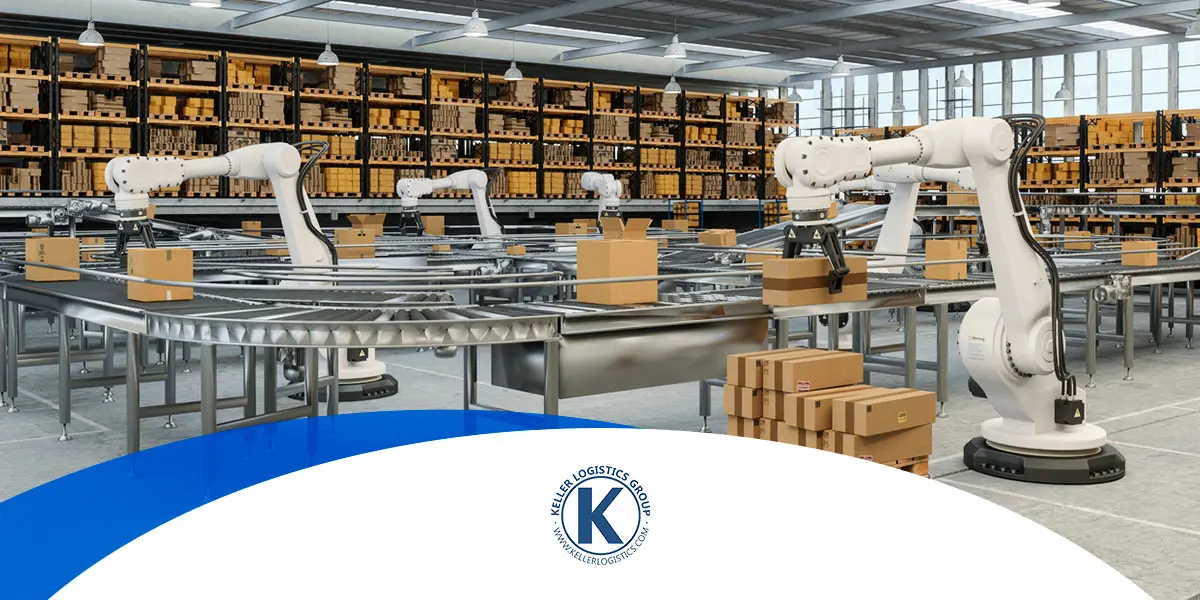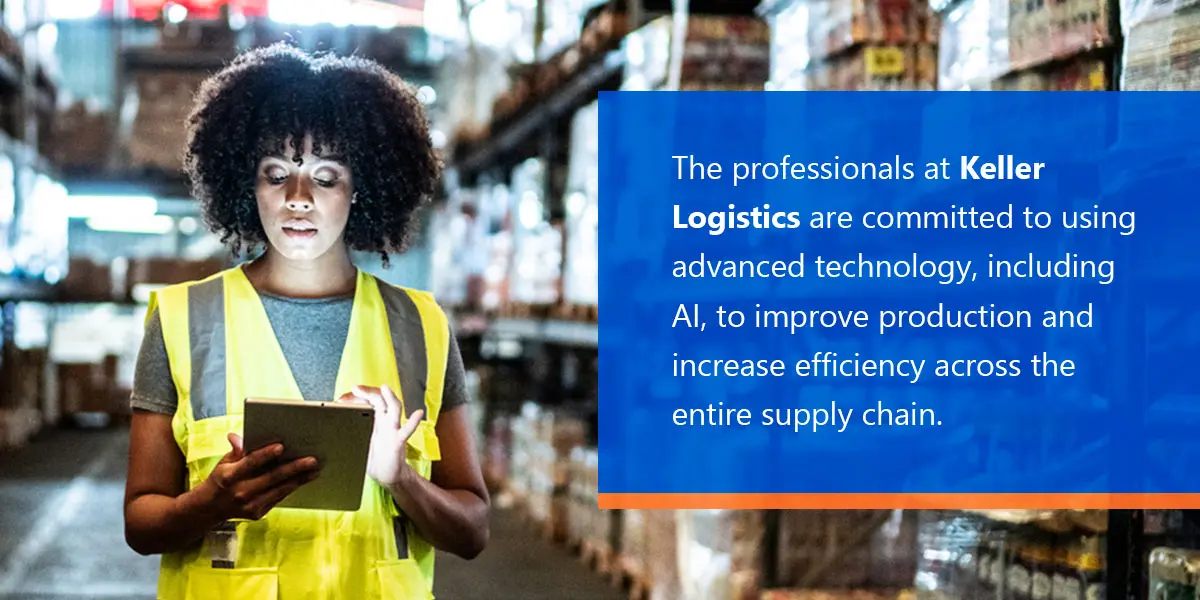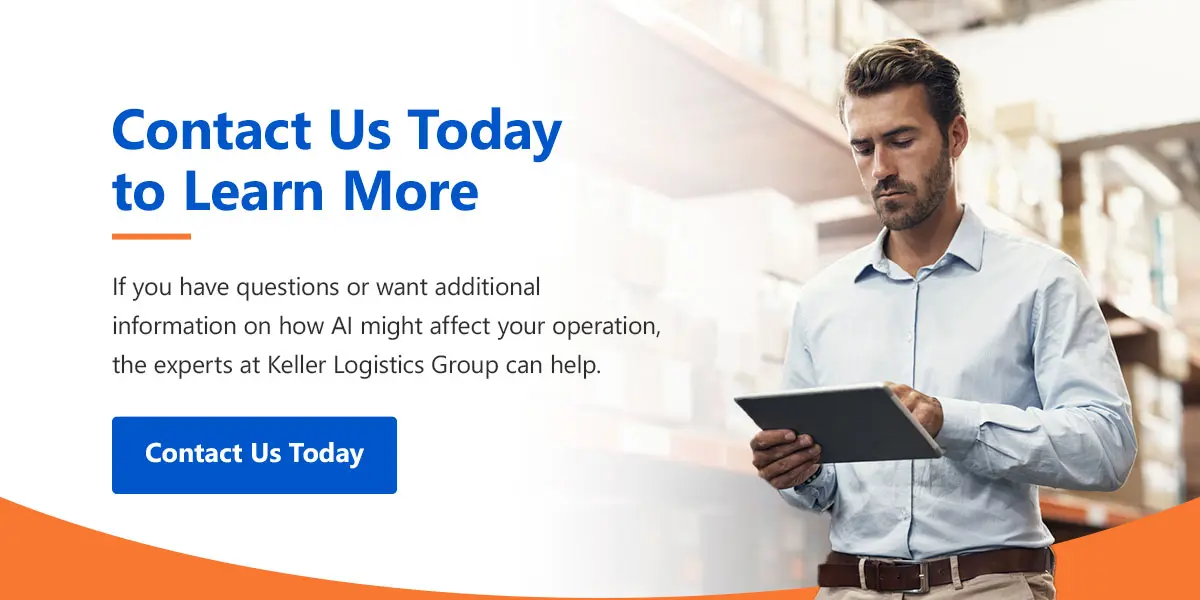


Artificial intelligence (AI) has taken the logistics industry by storm, already showing significant improvements in many applications across the supply chain.
Artificial intelligence in logistics has the potential to deliver optimized capabilities for planning and forecasting, increased productivity, lower operational costs, enhanced safety, and faster delivery times. Industry giants like Amazon, FedEx, and UPS have implemented the technology into their operations, leading many to believe that AI-powered solutions may soon dictate how third-party logistics (3PL) companies operate.
AI technology is transforming the logistics industry by providing 3PL operations and transportation companies with enhanced performance and increased cost savings. Applications of all types have experienced the positive ripples of AI in their operations, including food and beverage, packaging, plastics, automotive, building materials, consumer goods, and more.
Artificial intelligence is the ability of a machine or computer to perform human-like tasks and imitate intelligent behavior, including actions involving learning, thinking, reasoning, and decision-making. Machine learning is a subcategory of AI. Machine learning typically involves computer systems that can learn and adapt without human assistance or continuous programming. It uses statistical models and algorithms to analyze data and gradually improve its accuracy.
Many AI features like tracking, prediction, and vision recognition have enabled 3PLs to improve their operations and gain a competitive edge in their market niche.
Here are several ways that AI is impacting the future of logistics.
Third-party logistics companies have used AI in their inventory management systems for years. With an AI-powered system, companies can automatically see stock levels and initiate replenishment orders based on product demand. These capabilities minimize manual inventory tracking and help ensure products are immediately available when needed.
Many logistics companies use chatbots to receive customer delivery requests, answer questions, and provide delivery updates. These AI-powered devices can save companies time and money by streamlining communication on the operational front end as well as eliminating human interaction. More importantly, chatbots can give small to medium-sized companies the ability to provide customer service 24 hours a day, seven days a week, with minimal costs.
AI-powered navigation systems can optimize trucking routes and resolve logistical challenges, resulting in cost savings and faster delivery times. Route planning uses AI’s advanced algorithms and predictive analytics to calculate the most efficient routes and logical stop sequences to minimize drive time and increase fuel efficiency.
Predictive maintenance capabilities alert personnel to potential machine and equipment issues in the warehouse and on the road by analyzing real-time data collected from preinstalled sensors. This data enables technicians to perform the necessary maintenance tasks before a problem occurs, preventing extended downtime and saving significant money on repairs.
Autonomous trucks and drones have the potential to significantly improve the logistics industry, offering a range of benefits that can help businesses reduce costs, increase efficiency, and maximize safety. These vehicles feature cameras, radar sensors, and other advanced features to enable self-driving without human interaction. Many states have already approved the deployment of commercialized autonomous trucks.
Mobile robots use computer vision to efficiently and safely navigate a warehouse environment with no need for human interaction. These innovative devices offer distribution companies faster and more accurate options for performing basic warehousing tasks over conventional methods like conveyors, forklifts, and manual transport. Robotics are already prevalent in many technologically advanced 3PL operations, helping streamline labor and delivering significant cost savings.
While AI for logistics has the potential to improve the industry, there are possible drawbacks, including:
Artificial intelligence has the potential to shift the entire logistics landscape in the same way that mobile technology and the internet have optimized our daily lives.
As more companies discover the benefits of artificial intelligence and as the technology develops, AI capabilities will become more efficient and accurate. While many 3PLs have already implemented the more basic AI-powered systems in their operations, the mainstream application of more complex systems — like robotics and autonomous vehicles — will soon follow.
Transportation companies and 3PLs must evaluate AI’s potential risks and benefits while developing strategies to take advantage of the positive impacts on their operations. By doing so, these companies can provide better customer experiences, improve their productivity and efficiency, and create new employment opportunities to minimize the impact on the job market.

The professionals at Keller Logistics are committed to using advanced technology, including AI, to improve production and increase efficiency across the entire supply chain. We implement the latest software and programs — including Parade and project44™ — that offer various customer benefits for a broad industry range.
Parade’s analysis tools and internal reporting features can support your company’s business structure, giving you the metrics to track progress, set goals, and develop more efficient processes. The advanced tracking capabilities of project44™ provide our customers with real-time data showing the precise location of their shipments.
As new trends and advancements in AI emerge, the Keller Logistics team will evaluate the potential benefits and offer our customers the most valuable tools to improve their operations.

If you have questions or want additional information on how AI might affect your operation, the experts at Keller Logistics Group can help. We understand the unique dynamics of the industry, leveraging decades of combined experience and the most advanced tools to support your business.
Explore our comprehensive range of the industry’s top logistics services, from trucking and freight solutions to warehousing and co-packaging. Connect with us online today to speak with an expert.